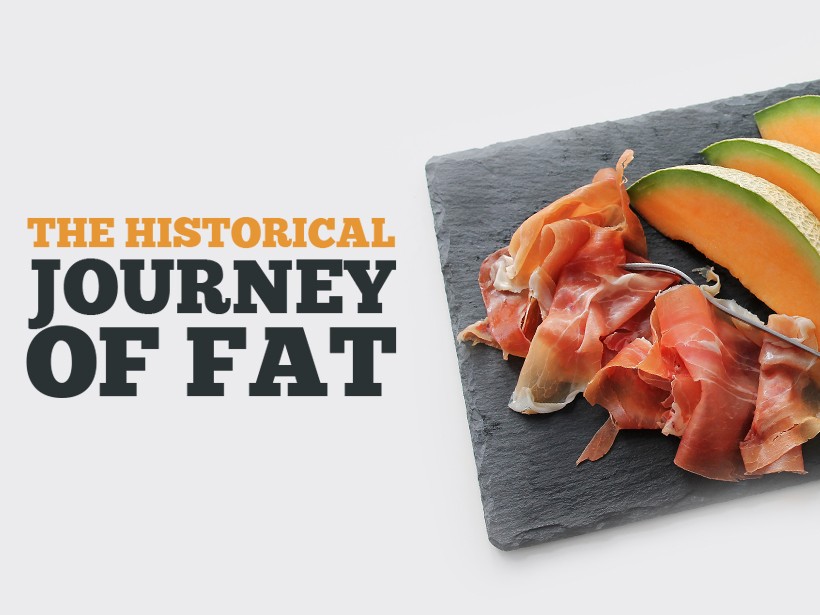Did you know that it was not always a given that diet was connected to our health? Believe it or not, the concept of a connection between what we eat and how we feel traces back to July of 1976. This was the year in which Sen. George McGovern called for an investigation into the potential interaction between our diet and our health after he noticed that rates of heart disease within Congress were on the rise.1 Since then, America's relationship with fat and the concept of incorporating fat into our diet has been turbulent, to say the least.
Curious about how our modern concept of dietary fat came to be? Read on to learn more about the journey of fat, from public enemy number 1 to an important component of weight loss.
The first food pyramid
In McGovern's first hearing, he chose to bring in one of America's premier nutritionists at the time, Nathan Pritikin. Pritkin warned of the dangers of overconsumption of fat, and the thinking of the day was made perfectly clear in front of Congress: “reducing fat is good for your health.” This statement led to the eventual creation of the first food pyramid, which encouraged Americans to replace their meats, cheeses, and milk with carbohydrates.2
While scientists intended for Americans to replace these types of fatty foods with complex carbohydrates, most people and news outlets simplified this correlation down to one basic thought: “If you want to be thinner, eat less fat and more carbs.”
The low-fat craze
If you're old enough to remember caring about your weight in the 1990's, there's no doubt that you remember the low-fat craze that swept grocery stores during this decade. Due to the new guidelines set forth by the FDA, the only message that Americans took away concerning their diet was that fat was the enemy and carbs were our friends.
Unfortunately, the war on fat did not end in a world full of slimmer waistlines. In fact, this was around the time when Americans started to balloon and obesity rates went up. Instead of focusing on consuming whole grains and vitamin-rich vegetables, dieters flocked to low-fat products that compensated for their lack of fatty flavor with refined wheat and sugars.
Fat's role in the modern American diet
In an interview with NPR, Brown University professor of nutrition confirmed that the low-fat diet craze did little to control America's appetite and that low-fat diets aren't the solution for obesity in America.
“There have been a number of studies done,” Flynn said, “and there's been no benefit for low-fat diets to lead to better weight loss, and there's no benefit for low-fat diets to lead to less disease.”3
Today, many diets incorporate the opposite of the 90's dietary recommendations and focus on using healthy sources of fat to keep you feeling full while avoiding the temptation to binge on empty carbohydrates that do little to satiate the brain. For example, research on the ketogenic diet has found that cutting carbohydrates and focusing on a medium-protein and high-fat diet can help obese and overweight Americans effectively lose weight when compared to standard diet and exercise.4
The bottom line? If you lived through the fat-free mania of the 90's and your version of the food pyramid still includes a floor packed with grains, it's time to update your idea of what weight loss looks like. Learn more about the ketogenic diet and how switching to a low-carb picture of health can potentially help you to drop excess pounds.
NUTRITIONAL DISCLAIMER
The content on this website should not be taken as medical advice and you should ALWAYS consult with your doctor before starting any diet or exercise program. We provide nutritional data for our recipes as a courtesy to our readers. We use Total Keto Diet app software to calculate the nutrition and we remove fiber and sugar alcohols, like erythritol, from the total carbohydrate count to get to the net carb count, as they do not affect your blood glucose levels. You should independently calculate nutritional information on your own and not rely on our data. The website or content herein is not intended to cure, prevent, diagnose or treat any disease. This website shall not be liable for adverse reactions or any other outcome resulting from the use of recipes or recommendations on the Website or actions you take as a result. Any action you take is strictly at your own risk.
- Keto Drives Increased Calorie Burn - July 11, 2019
- New High-Protein, Low-Sugar Greek Yogurt Hits Market - April 1, 2019
- Can Going Low-Carb Fight Back Fat? - December 4, 2018































